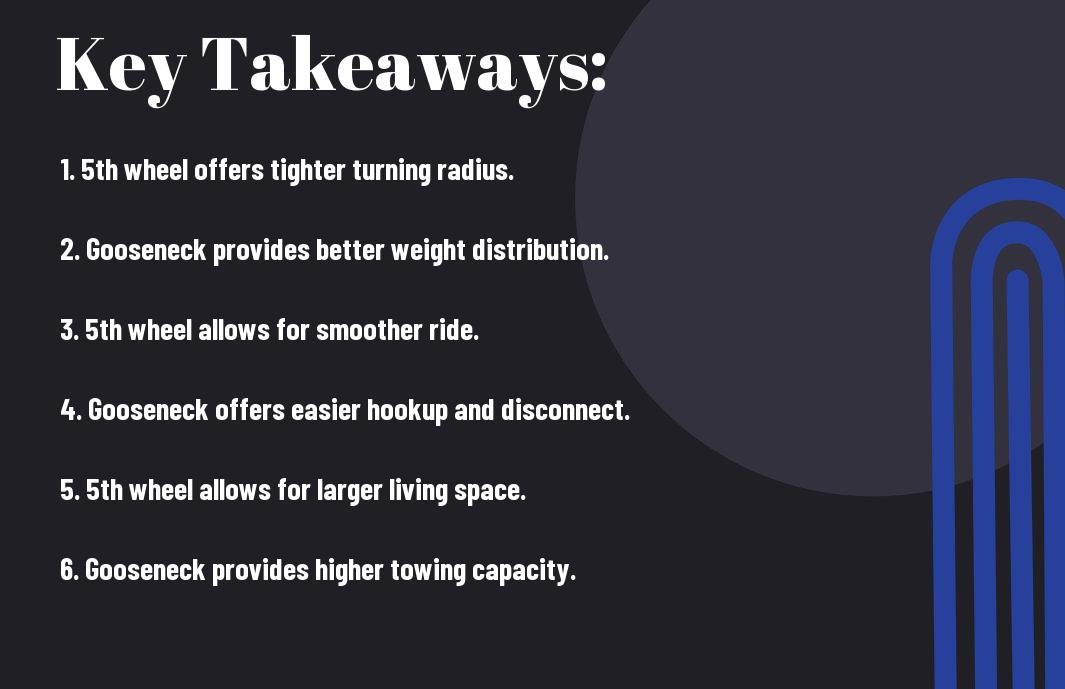When it comes to choosing the right towing setup for your trailer, the decision between a 5th wheel and a gooseneck can be pivotal. Both offer their own unique set of advantages and disadvantages, which can make the decision-making process quite daunting. However, with the right information and some guidance, you can make an informed decision that aligns with your specific towing needs and vehicle setup. In this blog post, we’ll delve into the key differences between a 5th wheel and a gooseneck, highlighting the crucial factors you need to consider, such as towing capacity, stability, and maneuverability. By the end of this post, you’ll have a clearer understanding of which option is the most suitable for your towing requirements.
Key Takeaways:
- Weight Distribution: A 5th wheel hitch provides better weight distribution compared to a gooseneck, which can lead to a smoother and more stable towing experience.
- Maneuverability: 5th wheel trailers generally offer better maneuverability when compared to gooseneck trailers, especially when navigating tight turns or backing up.
- Comfort: The design of a 5th wheel hitch often results in a more comfortable ride for both the driver and passengers, due to decreased sway and improved handling.
- Cost: While gooseneck hitches are usually less expensive to install, 5th wheel hitches provide better overall value in terms of towing performance and comfort.
- Truck Bed Space: Gooseneck hitches take up less space in the truck bed, leaving more room for cargo, while 5th wheel hitches require a larger footprint but offer better towing capabilities.
- Installation: Installing a gooseneck hitch is generally simpler and requires less modification to the truck bed, while a 5th wheel hitch may require more extensive installation work and potentially affect the truck’s payload capacity.
- Towing Capacity: 5th wheel trailers typically have a higher towing capacity compared to gooseneck trailers, making them a preferred choice for towing heavier loads.

Understanding the 5th Wheel Hitch
Any discussion about the 5th wheel hitch must start with understanding what it is and how it works. This type of hitch is designed to be mounted in the bed of a pickup truck, and it uses a jaw mechanism to connect to a kingpin on the trailer. This design allows for a smoother, more stable towing experience, especially when hauling heavy loads.
Design and Functionality
The 5th wheel hitch is built with a large, horseshoe-shaped plate that is mounted in the bed of the truck. This plate provides a stable platform for the kingpin of the trailer to connect to, distributing the weight of the trailer evenly over the rear axle of the truck. The hitch also features a jaw mechanism that locks onto the kingpin, providing a secure connection and reducing the amount of sway and movement between the truck and trailer.
Pros and Cons
When considering whether to choose a 5th wheel hitch for your towing needs, it’s important to weigh the pros and cons. Here are some of the key points to keep in mind:
Pros:
| Increased stability and control | Reduced sway and movement |
| Ability to tow heavier loads | More comfortable towing experience |
| Better weight distribution | Easy maneuverability |
Cons:
| Requires a pickup truck with a bed | Installation can be more complex |
| Reduced bed space in the truck | Higher cost compared to other hitch types |
It’s important to carefully consider these factors when deciding whether a 5th wheel hitch is the right choice for your towing needs.
Exploring the Gooseneck Hitch
Your decision to use a gooseneck hitch for towing is an important one, as it will greatly impact the stability and functionality of your towing setup. Understanding the design, functionality, and pros and cons of a gooseneck hitch will help you make an informed decision that suits your specific towing needs.
Design and Functionality
When it comes to design and functionality, a gooseneck hitch is characterized by a hitch ball mounted in the bed of the tow vehicle, which connects to a hitch on the front of the trailer. This design allows for a tighter turning radius compared to a 5th wheel, making it easier to navigate tight corners and maneuver in confined spaces. Additionally, the gooseneck hitch distributes weight evenly across the bed of the tow vehicle, providing greater stability and control while towing.
Pros and Cons
Understanding the pros and cons of a gooseneck hitch will help you weigh the benefits against the potential drawbacks. Below is a breakdown of the key advantages and disadvantages:
Pros
| Greater stability and control while towing | Ability to navigate tight corners and confined spaces with ease |
| Distributed weight evenly across the tow vehicle’s bed |
Cons
| Requires a special hitch installed in the bed of the towing vehicle | Potential for reduced bed space due to hitch installation |
| Limited to certain types of trailers |
Ultimately, weighing these pros and cons will help you determine if a gooseneck hitch is the right choice for your towing needs.
Comparative Analysis
After considering the key differences between 5th wheel and gooseneck trailers, it’s time to delve deeper into a comparative analysis of the two options. This will give you a clearer picture of the advantages and disadvantages of each, helping you make an informed decision.
Towing Capacity and Performance
When it comes to towing capacity and performance, both 5th wheel and gooseneck trailers have their own strengths. The 5th wheel trailer typically has a higher towing capacity, making it ideal for hauling larger and heavier loads. On the other hand, gooseneck trailers offer better weight distribution, leading to improved stability and maneuverability. The decision between the two will ultimately depend on the specific towing needs and preferences.
Compatibility and Versatility
When it comes to compatibility and versatility, both 5th wheel and gooseneck trailers offer unique benefits. The 5th wheel trailer is known for its easy installation and removal, making it a convenient option for those who frequently switch between towing and non-towing vehicles. On the other hand, gooseneck trailers provide a more flexible bed space in the towing vehicle, allowing for easier access to the cargo. Your choice will depend on how you prioritize ease of use and flexibility as well as the specific setup of your towing vehicle.
Safety Considerations
When it comes to safety, both 5th wheel and gooseneck trailers have important considerations. The 5th wheel trailer tends to provide a smoother and more stable ride due to its placement over the rear axle of the tow vehicle. On the other hand, gooseneck trailers offer better visibility and maneuverability due to their placement in the bed of the towing vehicle. It’s important to consider how these factors will impact your overall towing experience and safety on the road.
Cost Implications
Finally, cost implications also play a role in the decision between a 5th wheel and gooseneck trailer. While the initial cost of a gooseneck hitch may be lower, the overall cost of outfitting a vehicle for a gooseneck trailer can be higher. On the other hand, 5th wheel trailers often require a more substantial investment upfront but may offer cost savings in the long run due to their stability and towing capacity. Your budget and long-term expenses should be carefully considered when making your decision.
User Experiences
For anyone considering the 5th wheel vs gooseneck debate, it’s essential to hear from those who have firsthand experience with each type of hitch. Understanding the pros and cons from actual users can provide valuable insight into which option might be best for your specific needs.
Personal Stories from 5th Wheel Users
Many 5th wheel users praise the stability and maneuverability of this type of hitch. With the hitch placed in the bed of your truck, you’ll experience less sway and a smoother ride. Additionally, the turning radius of a 5th wheel is often greater, allowing you to navigate tighter turns with ease. However, be aware that some users have reported the need for additional maintenance due to the complex nature of the hitch.
Insights from Gooseneck Users
If you opt for a gooseneck hitch, you can take advantage of the increased flexibility it offers. The hitch can typically be placed further forward in the bed, giving you more room to maneuver and possibly allowing you to tow a larger trailer. One of the potential downsides of a gooseneck hitch is the decreased turning radius, which may limit your ability to navigate tight corners.
Conclusion
Drawing together all the aspects of 5th wheel vs gooseneck, it ultimately comes down to personal preference and specific towing needs. Both options have their own advantages and disadvantages, and it’s crucial to carefully consider your towing requirements before making a decision. Whether it’s the maneuverability and stability of a 5th wheel or the weight distribution and cost-effectiveness of a gooseneck, you need to prioritize what matters most to you. By weighing these factors carefully, you can confidently choose the hitch that best suits your towing needs and preferences. Remember, the right decision will ultimately provide you with a safer and more comfortable towing experience.
Why 5th Wheel vs Gooseneck
Q: What is a 5th wheel hitch?
A: A 5th wheel hitch is a popular towing technology that utilizes a hitch pin and fifth wheel hitch to connect the towing vehicle to the trailer. It is commonly used for larger trailers and offers increased stability and maneuverability.
Q: What is a gooseneck hitch?
A: A gooseneck hitch is a type of towing connection that uses a hitch ball and hitch receiver installed in the bed of a pickup truck. It is commonly used for heavy-duty towing and provides a high level of strength and durability.
Q: What are the benefits of using a 5th wheel hitch over a gooseneck hitch?
A: 5th wheel hitches offer greater stability and control while towing, especially on long journeys. They also provide a smoother ride due to their unique connection point in the bed of the towing vehicle, resulting in less wear and tear on both the vehicle and the trailer.
Q: When is a gooseneck hitch preferable over a 5th wheel hitch?
A: Gooseneck hitches are preferred for heavy loads and commercial towing applications. They are also commonly used for livestock trailers and flatbed trailers. Additionally, gooseneck hitches provide a tighter turning radius compared to 5th wheel hitches, making them ideal for maneuvering in tight spaces.
Q: Are there any drawbacks to using a 5th wheel hitch or gooseneck hitch?
A: One drawback of 5th wheel hitches is that they require a pickup truck bed for installation, which may limit cargo space. Gooseneck hitches, on the other hand, may have a lower vertical load limit compared to 5th wheel hitches. Additionally, installation of a gooseneck hitch may require modifications to the truck bed.
